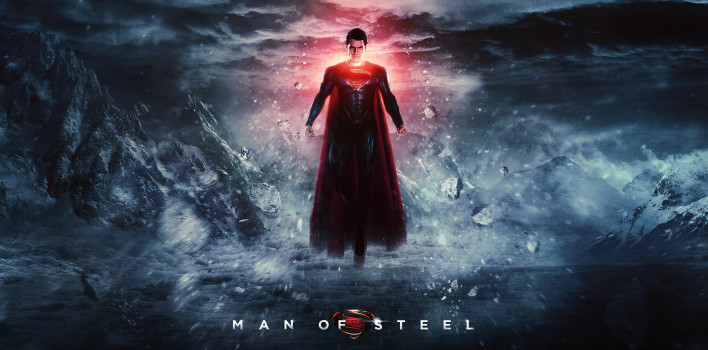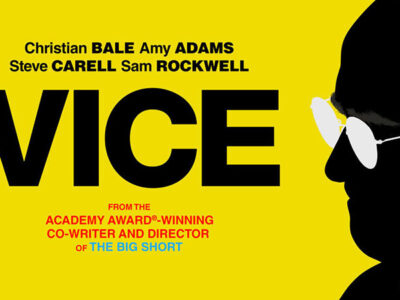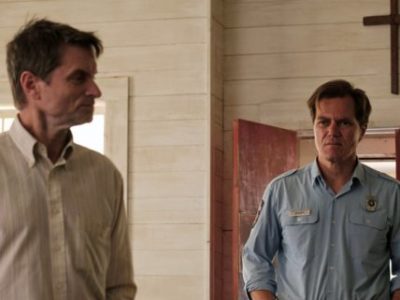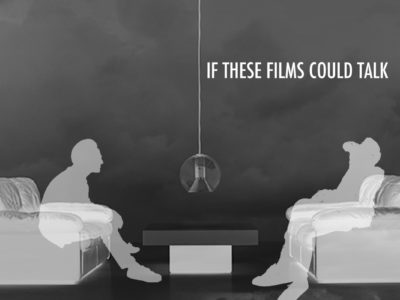Review| Man of Steel
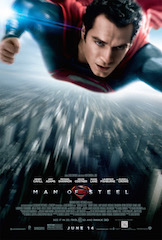 Man of Steel is the best Superman feature film ever attempted. Now before you jump down my throat, let me explain.
Man of Steel is the best Superman feature film ever attempted. Now before you jump down my throat, let me explain.
Superman has always been my favorite superhero (with Captain America being a close second). I loved the Christopher Reeve Superman movies growing up. Reeve was the best part of those movies because he took the part seriously. Anyone else would have looked stupid in that costume. He gave the material soul and depth.
Likewise, director Richard Donner took the material very seriously and wanted to capture the magic of believing a man could fly. I believe he succeeded for the time period. However, looking back at it with adult eyes, there were a few flaws that are hard to forgive.
Superman: The Movie‘s third act just never sat well with me, even as a kid. I respect Richard Donner’s attempt to make Superman exist in a real world, but it was an inconsistent tone. Maybe it wasn’t his fault because of the circumstances? I mean, Superman could turn the world backward and just fix everything? How do you create drama or conflict when you have a character that powerful?
 Gene Hackman’s Lex Luthor was neither threatening nor menacing. He had no other goal except evilness and villainy. I could almost see him laughing and twirling a mustache, Snidely Whiplash style. He was the worst part of those movies, which is a shame because he’s a great actor.
Gene Hackman’s Lex Luthor was neither threatening nor menacing. He had no other goal except evilness and villainy. I could almost see him laughing and twirling a mustache, Snidely Whiplash style. He was the worst part of those movies, which is a shame because he’s a great actor.
The sequels (Superman II, III, and IV: The Quest for Peace) drove everything into the realm of camp and goofiness and got progressively worse with each entry. The only thing that makes those films even remotely watchable is Chris Reeve.
Superman Returns tried to revive the franchise, but it ended up making things worse..and weird. It was written and directed by people who didn’t truly understand the character of Superman. They tried to instill strange, uncharacteristic sensibilities into him (night-stalking Lois Lane?) and turned him into a sad sack. And don’t even get me started on the kid.
Zack Snyder’s Man of Steel is a considerable improvement over what has been done in the past though I think most of the credit should go to David S. Goyer and Christopher Nolan. They started with what made Superman great and built upon it, rather than trying to shoehorn other attributes. The film is not without flaws (and there are many), but it’s a good film.
Going more in depth… SPOILERS AHEAD
The Good

I liked most of the casting choices, especially Henry Cavill as Clark Kent / Superman. He had the charm of Christopher Reeve and a certain stoic respectability, with a small amount of vulnerability. He communicated a lot with a simple look.
Michael Shannon’s General Zod was great. Terence Stamp’s take never really went beyond camp (though still great in its own way). This Zod had depth and wasn’t a mustache-twirling megalomaniac bent on evilness.
I loved this incarnation of Krypton. Loved it. The planet and civilization seemed ancient and lived-in. It was a real world with structure and rules. The Donner film’s portrayal of the sterile, academic, crystalline Krypton never really appealed to me.
Man of Steel‘s story structure was unique and inspired. It could have been boring if the film was just linearly telling Clark’s childhood story. I liked the jumps in time. Not only did it get a lot of necessary story elements in a very short time; it also gave the audience an insight into Clark’s character. We see his past as he remembers and is reminded of things on his journey. It would have been nice to see more of Clark’s farm life, but perhaps they’re going to save that for a sequel.
The Not-So-Good
Oh Zack Snyder, how I hoped you could stop overusing the shaky-cam. Not every shot (and I mean every shot) has to shake. Even the quiet moments were shaky. The shakiness got so bad in some of the action scenes that I didn’t know what was going on, or who was doing what.
Amy Adams is one of the weakest Lois Lanes ever. She’s a fine actress (great in roles like Enchanted‘s Giselle), but she was not very likable in this role. Lois has always had a spunky cockiness to her – a personality that went great with Clark’s more cautious and reserved demeanor. She was ballsy but cute about it. Now she’s just ballsy and annoying.
 This Lois wasn’t given much to do and was used mainly as a plot device. The romance between her and Superman was very forced. I was anticipating more of the couple’s trademark slow-burn sexual tension. The dynamic between the two is also drastically different because Lois knows who Superman is from the start. I still don’t know how I feel about that. It might be interesting.
This Lois wasn’t given much to do and was used mainly as a plot device. The romance between her and Superman was very forced. I was anticipating more of the couple’s trademark slow-burn sexual tension. The dynamic between the two is also drastically different because Lois knows who Superman is from the start. I still don’t know how I feel about that. It might be interesting.
The amount of collateral damage during the super-fights was a little too much to suspend disbelief. Buildings in Metropolis and Smallville were coming down left and right, and people were being sucked up into, and crushed by, the world engine. How many thousands of people died? It would have been nice to see Superman saving, at least, a few of them.
Destroying everything doesn’t really give the story anywhere to go. I can, however, see a potential inroad for Lex Luthor’s introduction to the series, which could be interesting if done correctly. I guess we’ll have to wait for Batman v Superman to find out.
The super-battles were also too clean – not in terms of the surroundings, but in terms of the combatants themselves. Even if he is Superman, being punched by someone just as powerful, or thrown through a building would leave maybe a mark or two, or at least, get him dirty. Superman emerged from a smashed building not only unscathed but unsoiled. The rubble would leave some residue at the very least.
Themes and Thoughts
Man of Steel is a very apt title for this movie. Snyder’s Superman is more human, which was probably the best thing about the movie.
 The Superman mythos is seen as a Christ metaphor by philosophers and theologians. After all, the heart of the story is a powerful being coming to earth to save humanity, humbling himself in order to pass off as a normal person, and doing extraordinary things.
The Superman mythos is seen as a Christ metaphor by philosophers and theologians. After all, the heart of the story is a powerful being coming to earth to save humanity, humbling himself in order to pass off as a normal person, and doing extraordinary things.
The original film series (or just the first film, anyway) really latched onto the metaphor, even having Jor-El paraphrasing John 3:16 when giving his “only son” his mission on earth. The Donner Superman was a seemingly perfect being with few “human” attributes (“Lois, I never lie”).
It wasn’t until I became a Christian that I realized it was better for Superman to be more human. Not only is he more relatable of a character, but the difference between him and the Lord is very clearly defined. As a kid who was not yet a believer, I used to get upset when Superman stories depicted him doing things that were not perfect and good – as if my perfect savior/hero had flaws. How dare they!
As my mind began to mature, and more of my heart was given to Jesus, I realized that a flawed Superman was a good thing. Mind you, I would still raise my eyebrow when he did something completely out of character (see Superman Returns). He was still a boy scout to me, just not a god.
“You just have to decide what kind of a man you want to grow up to be, Clark. Because whoever that man is, good character or bad, he’s gonna change the world.” Jonathan Kent
In Man of Steel, Kal-El struggled with the choice he had to make to use his powers and abilities for good or evil. We all must make the choice to serve God and use the gifts He gives us for good, or to turn away from Him and use them for our own selfish desires. The apostle Paul elaborates on this in 1 Corinthians, chapter 12 when he talks about the “gifts of the Spirit,” which are meant to glorify God. They’re not things like the ability to fly or see through walls, but these gifts do serve His purpose. Each person is important and, by design, has something to contribute.
However, despite Kal-El’s humanity, that doesn’t stop this new film from making some Jesus/Superman references. Snyder juxtaposed a stained glass image of Jesus with Superman in the frame. To prove that he was not a threat, Kal-El allowed the military to restrain him (though he could easily break the chains) and turn him over to his enemies
Restraint, another Christ-like virtue, is a pivotal theme of this film. From Clark being bullied as a child to being taunted by a bunch of reprobates in a bar, he suffered much and yet decided not to act (well, apart from turning that jerk’s truck into a junk pile). The Kents, his earth parents, taught Clark many lessons on how to restrain himself, and that lashing out at others would not resolve small disputes.
Unlike Superman, Jesus was born with the knowledge that He was the Savior, as illustrated in the second chapter of Luke. Mary and Joseph had lost Jesus at age twelve and found Him sitting among the teachers in the temple. When asked where He had been, Jesus replied, “Why were you searching for Me? Didn’t you know I had to be in My Father’s house?”
Pastor James Harleman explains in his book, Cinemagogue, that as we grow more in our relationship with Christ, we begin to realize that we are not the hero of the story – Jesus is. He is here to save us. It took me a long time to get that straight. For too long I still wanted to be the hero in my own story.
The immigrant analogy has always been part of the fabric of the Superman story. Creators Jerry Seigel and Joe Shuster were children of Eastern European immigrants and instill the story with a subtle subtext. This version embraced that subtext and added more layers.

Krypton is not the peaceful, perfect and sterile utopia of the past films. It is a dark, totalitarian state on the verge of collapse, similar to many despondent countries like the old Soviet Union. It is a place where people’s societal positions are predetermined at birth, with no room for free choice.
Jor-El and Lara wish more for their son Kal, and their hopes and dreams travel with him to a new place. As the planet is inevitably destroyed, Lara looks to the sky with hope and implores her son to make earth “a better world” than theirs.
Oppressed people from all over the world come to America looking for the promise of a future where they determine what they will do with their lives. They, like Superman’s parents, risk everything to give their children the chance at a better life.
When Kal-El comes to earth, he is adopted and assimilated into the culture. He considers himself human, and an American (“I was raised in Kansas; I’m probably about as American as anyone can be”). When faced with the decision to choose to destroy his adopted home or the rebuild the world he came from, he chooses the former. He doesn’t consider his birth culture superior, but lives among us humbly, and strives to be a productive member of society.
It is a good lesson about what true immigration should be: not demanding accommodation or separate consideration, but melting into the culture, and using one’s individual talents to be productive and prosperous; being aware of your heritage, but not being defined by it.

Zod, on the other hand, is a tragic product of the old world. He was selectively bred and programmed from birth to protect Krypton, believing in the old ways and talking of wiping out “inferior” bloodlines. This adds a more sympathetic tone to Zod’s character. However, what he chooses to do with his newfound choice makes him an agent of destruction.
Zod’s dilemma reminded me of a PBS documentary I watched recently called After the Wall: A World United, which chronicled life in former East Germany after reunification with the West and the eradication of the communist bloc. While most of the citizens were grateful for their freedom, there were some who were depressed and downtrodden. They had worked for the state their whole lives, believing in the tenants of communism. Now that they had their freedom, they weren’t sure what to do. Everything had been preplanned for them up to that point. They were victims of an amoral system of slavery, much in the way Zod was.
This emptiness in Zod eventually leads to the climax, which many found controversial – the death of Zod at the hands of Superman. I never found it shocking or controversial. Superman had no choice but to kill Zod. There was no way that Zod was going to live without his prescribed purpose, and he was going to take his anguish out on innocents – the people he perceived Kal-El favored over the possibility of building a new Krypton. Superman did not want to kill him, as evidenced by his bereaved cry afterward.
One of the film’s most interesting pieces of dialogue occurred during the Smallville battle. Faora, Zod’s second-in-command, smashed Superman through an IHOP and tells him that he cannot win the fight.
“You are weak, Son of El…unsure of yourself. The fact that you possess a sense of morality, and we do not, gives us an evolutionary advantage. And if history has proven anything, it is that evolution always wins.”
There is an embedded arrogance and amorality in evolutionary theory. Morality has no place in the cold, “reasoned” belief in macroevolution. If life is only an accident, then no one morality is better than another. Everything is arbitrary. In a world that is allegedly devoid of a Creator and source of ultimate authority, it is unreasonable to carry a sense of morality, and Faora is correct.
The fact that we perceive specific behaviors as right and wrong indicates that we are more than mere animals or cosmic accidents. God has instilled in all of us, whether we believe in Him or not, the ability to discern right from wrong – a moral compass. That is why we can look at a society like Iran or North Korea and say that what they do to punish alleged criminals (like practicing Christians) is wrong.
Conclusion
Despite its flaws, Man of Steel is a good representation of the Superman character we all know and love, only given more depth and dimension. David Goyer strikes the right balance between humanity and power, and it makes him more relatable as a character. Again, not a god, just a boy scout.
I hope that Goyer and Zack Snyder build upon what they have done and learn what works and what doesn’t. Based on what has been said about the upcoming Batman v Superman: Dawn of Justice, I am cautiously optimistic.



